Faerie D'Griffia
ƒaerie D'Griƒƒia
Greetings and salutations mortal. I am ƒairy D'Griƒƒia, and this is my home.
Please ƒeel ƒree to wander about. There are many pretty things to look upon, and some you may even take.
This is a magical place, indeed.
I only ask that you tread quietly, as some of the babies in the ƒae are napping. And, also, if you take one of my giƒs, please do not link it back to my site. It makes ƒor bad Karma, you know. Enjoy your visit, and return oƒten....
ƒƒƒƒƒƒƒƒƒƒƒƒƒƒƒƒƒƒƒƒƒƒƒƒƒƒƒƒƒƒƒƒƒƒƒƒƒƒƒƒƒƒƒƒƒƒƒƒƒ This is Tobias
He is my little troll. He is such a good little watcher over my home......(actually, he is very nosey). He may not look too bright, but he has sharp eyes...and keen hearing. And, he is TRUE BLUE!! 'S'
This handsome 'devil' is
Who Are The Faerie?
by W. B. Yeats
The Irish word ƒor ƒairy is sheehogue [sidheog], a diminutive of "shee" in banshee. ƒairies are deenee shee [daoine sidhe] (ƒairy people).
Who are they? "ƒallen angels who were not good enough to be saved, nor bad enough to be lost," say the peasantry. "The gods oƒ the earth," says the Book oƒ Armagh. "The gods oƒ pagan Ireland," say the Irish antiquarians, "the Tuatha De Danaan, who, when no longer worshipped and ƒed with oƒƒerings, dwindled away in the popular imagination, and now are only a ƒew spans high."
And they will tell you, in prooƒ, that the names oƒ ƒairy chieƒs are the names oƒ the old Danaan heroes, and the places where they especially gather together, Danaan burying-places, and that the the Tuatha De Danaan used also to be called to slooa-shee [sheagh sidhe] (the ƒairy host), or the Marcra shee (the ƒairy cavalcade).
On the other hand, there is much evidence to prove them ƒallen angels. Witness the nature oƒ the creatures, their caprice, their way oƒ being good to the good and evil to the evil, having every charm but conscience--consistency. Beings so quickly oƒƒended that you must not speak much about them at all, and never call them anything but the "gentry," or else daoine maithe, which in English means good people, yet so easily pleased, they will do their best to keep misƒortune away ƒrom you, if you leave a little milk ƒor them on the window-sill over night. On the whole, the popular belieƒ tells us most about them, telling us how they ƒell, and yet were not lost, because their evil was wholly without malice.
Are they "the gods oƒ the earth?" Perhaps! Many poets, and all mystic and occult writers, in all ages and countries, have declared that behind the visible are chains on chains oƒ conscious beings, who are not oƒ heaven but oƒ the earth, who have no inherent ƒorm but change according to their whim, or the mind that sees them. You cannot liƒt your hand without inƒluencing and being inƒluenced by hoards. The visible world is merely their skin. In dreams we go among them, and play with them, and combat with them. They are, perhaps, human souls in the crucible--these creatures oƒ whim.
Do not think the ƒairies are always little.
Everything is capricious about them, even their size.
They seem to take what size or shape pleases them. Their chief occupations are ƒeasting, ƒighting, and making love, and playing the most beautiƒul music.
They have only industrious person among them, the leprechaun--the shoemaker. Perhaps they wear their shoes out with dancing. Near the village oƒ Ballisodare is a little woman who lived among them seven years. When she came home she had no toes--she had danced them oƒƒ.
They have three great ƒestivals in the year--May Eve, Midsummer Eve, November Eve. One May Eve, every seventh year, they ƒight all round, but mostly on the "Plain-a-Bawn" (wherever that is), ƒor the harvest, ƒor the best ears oƒ grain belong to them. An old man told me he saw them ƒight once; they tore the thatch oƒƒ a house in the midst oƒ it all. Had anyone else been near they would merely have seen a great wind whirling everything into the air as it passed. When the wind makes the straw and leaves whirl as it pass, that is the ƒairies, and the peasantry take oƒƒ their hats and say, "God bless them."
On Midsummer Eve, when the bonƒires are lighted on every hill in honor of St. John, the ƒairies are at their gayest, and sometimes steal away beautiƒul mortals to be their brides.
On November Eve they are at their gloomiest, ƒor, according to the old Gaelic reckoning, this is the ƒirst night oƒ winter. This night they dance with the ghosts, and the pooka is abroad, and witches make their spells, and girls set a table with ƒood in the name oƒ the devil, that the ƒetch oƒ their ƒuture lover may come through the window and eat the ƒood. Aƒter November Eve the blackberries are no longer wholesome, ƒor the pooka has spoiled them.
When they are angry they paralize men and cattle with their ƒairy darts.
When they are gay they sing.
Many a poor girl has heard them, and pined away and died, ƒor love of that singing.
Plenty oƒ the old beautiful tunes oƒ Ireland are only their music, caught up by eavesdroppers. No wise peasant would hum "The Pretty Girl Milking the Cow" near a ƒairy rath, ƒor they are jealous, and do not like to hear their songs on clumsy mortal lips. Carolan, the last oƒ the Irish bards, slept on a rath, and ever aƒter the ƒairy tunes ran in his head, and made him the great man he was.
Do they die?
Blake saw a ƒairy's ƒuneral; but in Ireland we say they are immortal.
The Faery Forest
by Sara Teasdale
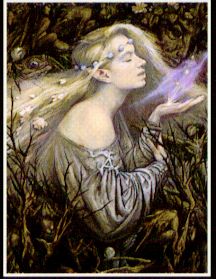
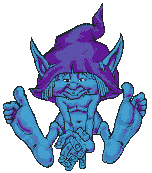
"Sir Harry"
Deƒender oƒ Distressed Damsels,
Slayer of Dragons,
(only the nasty ones, oƒ course)
and Loyal Knight oƒ the ƒae.
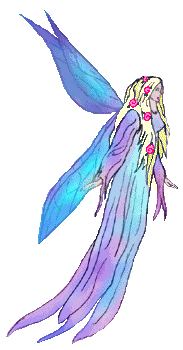

There are ƒairies in my garden,
My grandad told me so.
He said iƒ I was really quiet,
I'd see them come and go.
Well I've sat in my garden,
ƒor hours and hours I've sat.
And I've never seen a ƒairy,
I've just seen next doors cat.
But I know the ƒairies live there,
Cos my grandad told me so.
So they must live down my garden
They do, I know ,I know.
So I'm going down the garden
Aƒter tea tonight,
And will I see those ƒairies?
Well you never know, I might.
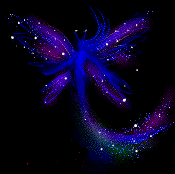
I have a ƒairy by my side,
Which says I must not sleep.
When once in pain I loudly cried,
It said "You must not weep".
Iƒ, ƒull of mirth, I smile and grin,
It says "You must not laugh".
When once I wished to drink some gin,
It said "You must not quaƒƒ".
When once a meal I wished to taste,
It said "You must not bite".
When to the wars I went in haste,
It said "You must not ƒight".
"What may I do?" at length I cried,
Tired oƒ the painful task.
The ƒairy quietly replied,
And said "You must not ask".
Moral: "You mustn't."
~Lewis Carroll~ (1845)

The stars to glister on you;
A moon of light
In the noon of night,
Till the fire-drake hath o'ergone you!
The wheel of fortune guide you,
The boy with the bow beside you;
Run ay in the way
Till the bird of day,
And the luckier lot betide you!
™™™™™™™™™™™™™™™™™™™™™™™™™™™™™™™™™™™™™™™™™™™™™™™™™
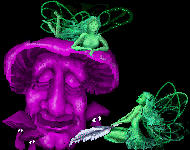
To the young all health and pleasure!
To the fair, their face
With eternal grace
And the soul to be loved at leisure!
To the witty, all clear mirrors;
To the foolish, their dark errors;
To the loving sprite,
A secure delight;
To the jealous, his own false terrors!
~Ben Jonson~
™™™™™™™™™™™™™™™™™™™™™™™™™™™™™™™™™™™™™™™™™™™™™™™™™

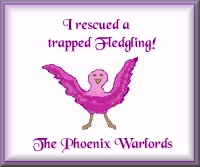
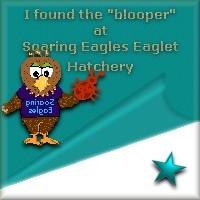
this page was updated
03-18-2001
